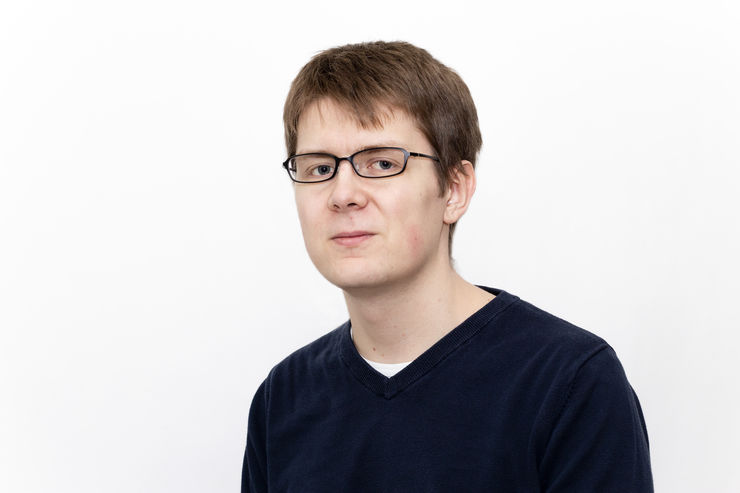 Photo credit Karin Johansson
Photo credit Karin Johansson
Why did you start your PhD?
I was interested in mathematics even as a child. It's been a straight line, from the science track in high school to bachelor and master studies at LiU. When I finished my master's, the Department of Mathematics advertised a PhD position and it was easy to apply.What is it about mathematics that you enjoy?
Mathematics is exciting and creative. You might not expect that when you look at it from the outside. It's not just counting numbers in different formulas, it's so much more than that. It's about seeing things from new perspectives and finding the right angle to solve problems. It's a creative process and it's fun to solve problems.What do you research?
I research non-commutative geometry, that is, I study structures called non-commutative algebras with geometric tools. It's an area of research discovered by physicists in the 90s when they realised it could help them understand how space works at the quantum level.What does a PhD student do?
As a PhD student, you take courses to broaden your knowledge and gain more skills in mathematics. These are courses in standard subjects such as algebra, differential geometry and functional analysis. When you start your PhD, you will have a research area. You'll also have a supervisor who can help you write papers and get them published. The supervisor also provides feedback on your research. You'll do a licentiate thesis and finish by writing a doctoral dissertation. At LiU, you also have teaching for 25% of your working hours.What is it like to teach?
I find it fun. It's an interest that has grown over time, I was already teaching as a student. It's nice to talk to students and see what problems they are struggling with and try to pass on knowledge. It's also exciting to get back to the basic courses that I myself have taken. Now I can look at them with new perspectives and have a better ability to understand what is going on.What is the best thing about doing a PhD?
Getting to delve into something that you find interesting. As a PhD student, you have a lot of freedom, for example how you want to spend your working hours. Teaching is also fun.What is the most difficult thing about doing a PhD?
Having so much freedom can also be difficult. It has been a challenge for me to plan my time and structure my schedule. Research in general comes with a certain amount of pressure, it can be hard to do research and you often struggle with the question of whether the research you are doing is good enough. It is very easy to feel inferior when discussing with more experienced researchers. These are things you have to work on. You have to believe in yourself and your research. Then it helps to have a good supervisor who supports you. Discussing with other PhD students who are experiencing the same thing is also good.What qualities are good to have if you want to do a PhD?
First of all, you need to be interested in your subject. If you have the interest, the opportunity and the confidence, you can always try! Be prepared to sacrifice a little, such as your salary. If I had worked as a civil engineer, I would have earned more. But as a PhD student, you put that aside, you have another goal in mind.What is important to consider when applying for a PhD?
Try to find a good research group and a good supervisor. Get in touch with the department and talk to people there. Find out what the requirements are for a PhD student. It is also important to continually ask yourself do you really want to do this or is it just convenient to continue. Now that I'm getting close to my PhD, that's something I'm also thinking about. It's important to have perspective and be honest with yourself.Do you already know what you want to do in the future?
I could continue on the academic path and apply for a postdoc position, probably abroad. But as it stands now, I want to do something else. I would like to continue with education in some way but maybe not as a teacher. That could be anything from creating educational materials online to advocating politically for education.I certainly don't regret studying mathematics; I wanted to learn more and I have. Now I have a clearer picture of the mathematics I am interested in. I have a much broader perspective and new ideas. My tutor's way of working and looking at mathematics has rubbed off on me. I have gained many things that I perhaps did not think I would gain when I started my PhD.
